August 27, 2025

The article titled "10 Essential ABA Interventions for Effective Behavior Change" identifies crucial interventions in Applied Behavior Analysis (ABA) that drive meaningful behavior modification. It highlights techniques such as:
Each illustrates their significant role in promoting desired behaviors and facilitating developmental progress in children facing behavioral challenges.
In today's landscape, the demand for Board Certified Behavior Analysts (BCBAs) is soaring. Understanding and implementing these interventions is not just beneficial; it is essential for effective practice. By leveraging these techniques, practitioners can ensure a more tailored approach to support children in overcoming their challenges.
Have you considered how these interventions could transform your practice? The effectiveness of ABA is underscored by a wealth of data and real-world examples that demonstrate their impact. As you reflect on your current strategies, think about how integrating these interventions can enhance your outcomes.
In conclusion, the insights provided in this article serve as a call to action for practitioners to embrace these essential interventions. By doing so, they can significantly improve the lives of children with behavioral challenges, ensuring a brighter future for their developmental journey.
The landscape of Applied Behavior Analysis (ABA) is rapidly evolving, marked by an increasing demand for effective interventions that foster positive behavior change. As professionals in this field strive to enhance their practices, it is crucial to understand the essential strategies that lead to meaningful outcomes. This article delves into ten vital ABA interventions that not only empower practitioners but also significantly impact the lives of the individuals they serve.
How can these interventions be tailored to meet the unique needs of each child, ensuring that every effort contributes to lasting behavioral improvements?
The demand for Board Certified Behavior Analysts (BCBAs) is projected to surge by an astounding 25% by 2026. This growth highlights the necessity for professionals in the field to connect with effectively. Hire ABA is a dedicated recruitment platform that bridges the gap between qualified BCBAs and the rapidly expanding field of ABA interventions in Applied Behavior Analysis (ABA) therapy. By streamlining the hiring process, Hire ABA empowers professionals to find roles that align with their expertise and career aspirations efficiently.
How well does your current recruitment strategy address the needs of skilled BCBAs? Our personalized resume assessments ensure that each candidate's experience and aspirations are thoroughly evaluated. This meticulous approach allows us to match them with the best roles available. Utilizing advanced job fit scoring, we identify opportunities that align with their skills, preferences, and desired locations.
The growth of job postings for BCBAs—from 7,091 in 2017 to 16,109 in 2018—underscores the necessity for job seekers to utilize platforms tailored to their specific needs. The effectiveness of Hire ABA is further illustrated through successful job placements, including a candidate who secured a Legal Director role within a month of engagement. This showcases the platform's ability to match talent with opportunities swiftly.
As the landscape of ABA interventions evolves, leveraging specialized recruitment platforms like Hire ABA becomes essential for professionals aiming to advance their careers in this impactful field. Don’t miss out on the opportunity to elevate your career—partner with Hire ABA today.
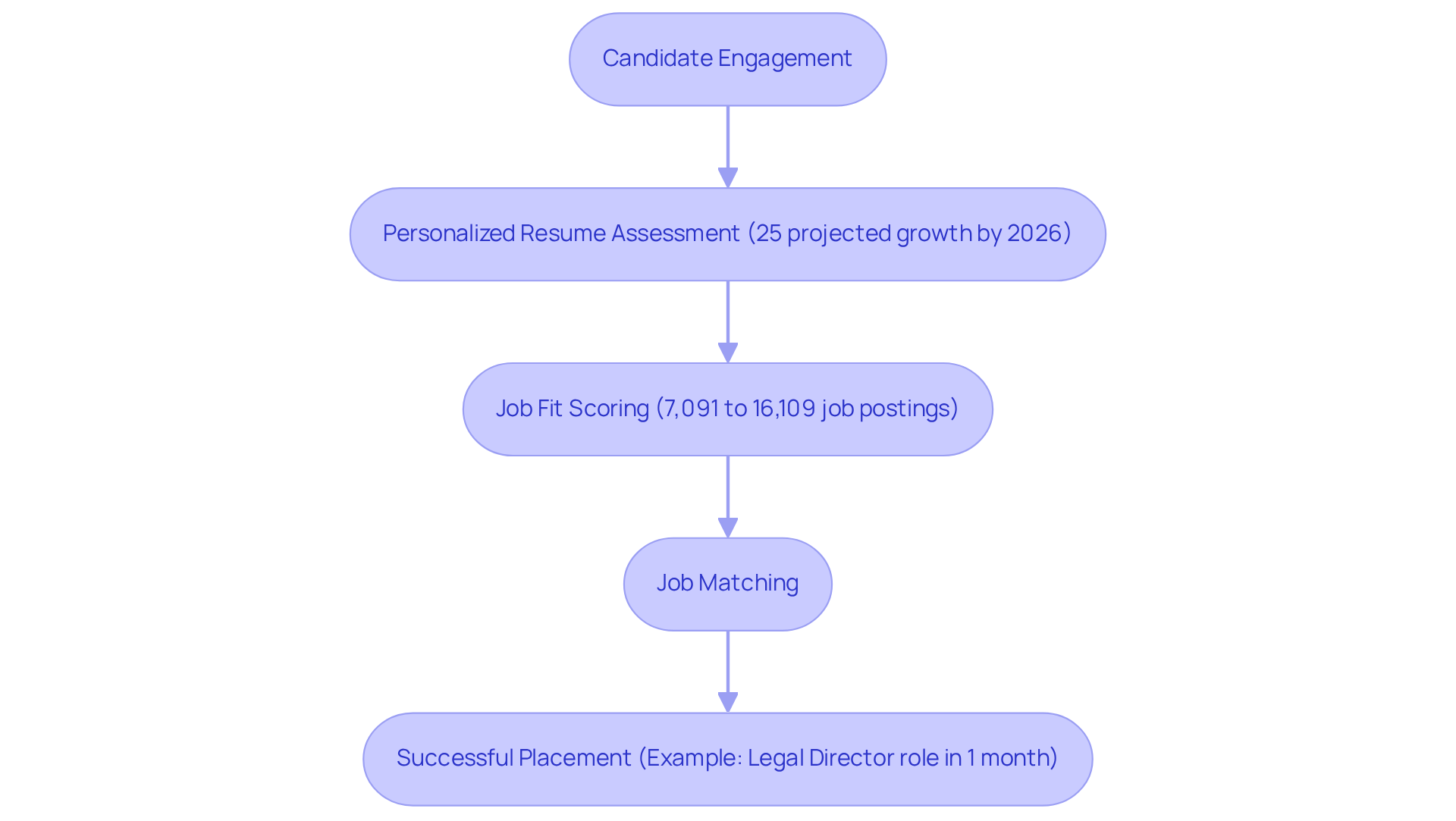
Positive reinforcement is a pivotal approach in ABA interventions, characterized by the immediate provision of a reward following a desired action. This methodology dramatically enhances the likelihood of that action being repeated. Common forms of reinforcement in ABA interventions include verbal praise, tokens, and tangible rewards, all meticulously tailored to the individual preferences of the student. Notably, studies reveal that approximately 80% of therapists (N=266) actively employ positive reinforcement techniques, which are a key component of ABA interventions recognized for their efficacy in fostering preferred actions and facilitating learning.
The regular application of ABA interventions not only inspires youngsters to but also nurtures overall development, enhancing social interactions and communication skills. Research consistently indicates that ABA interventions using customized reinforcement methods lead to significant behavioral changes, underscoring the importance of adapting techniques to meet each individual's unique needs. Furthermore, continuous monitoring remains essential to assess the effectiveness of reinforcement strategies over time. By integrating ABA interventions and positive reinforcement into therapy, practitioners can cultivate supportive environments that promote growth and autonomy in youth.

Discrete Trial Training (DTT) stands as a structured teaching approach that effectively dissects abilities into small, manageable components. Each trial is composed of:
This method proves particularly effective for , as it establishes clear expectations and delivers prompt feedback, thereby facilitating skill acquisition within a controlled environment.
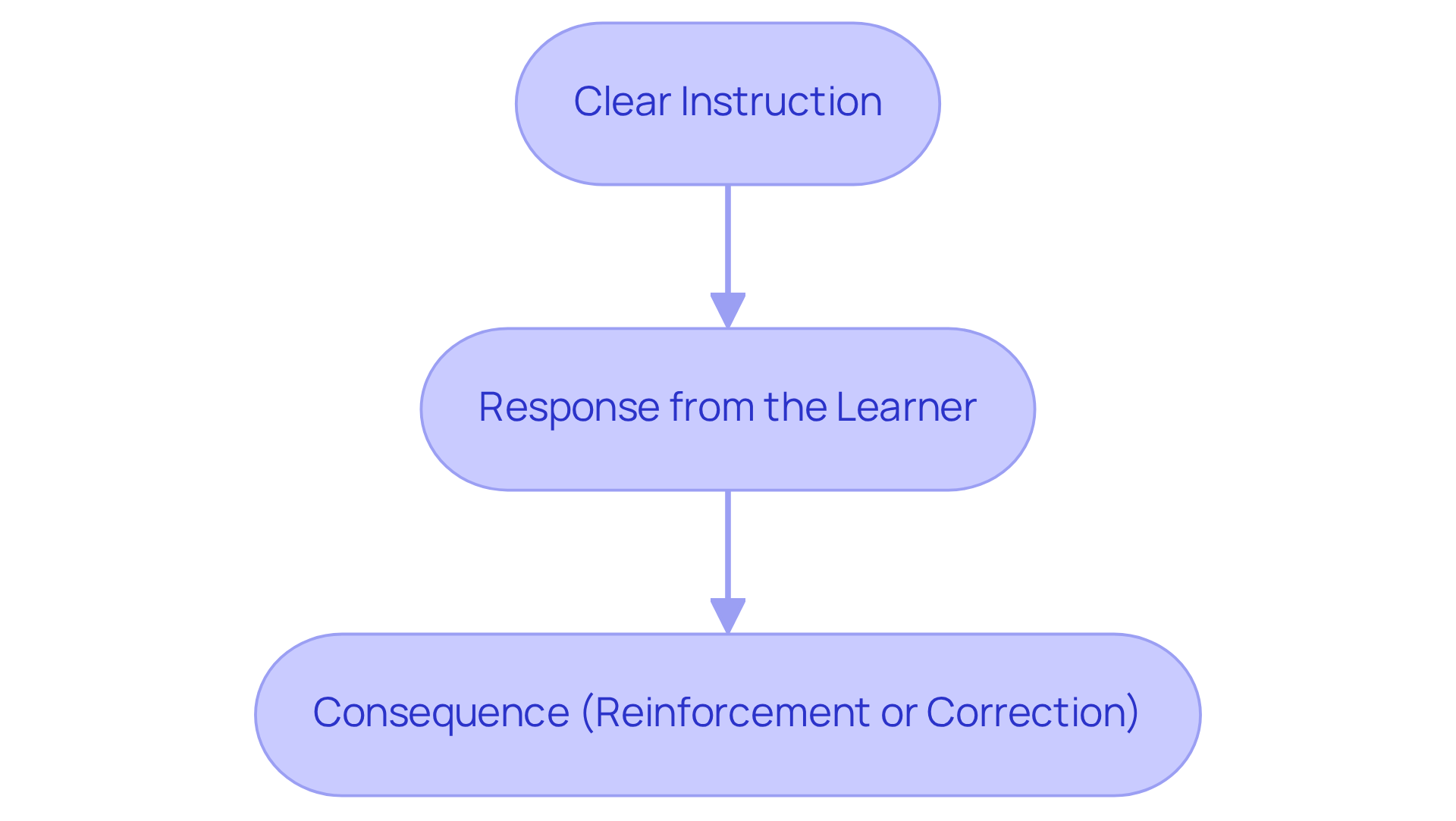
Pivotal Response Training (PRT) stands as a pivotal intervention that zeroes in on essential facets of a young person's development, including motivation, self-management, and social initiations. By concentrating on these critical behaviors, PRT seeks to foster comprehensive improvements across various domains of functioning. Notably, research has demonstrated that PRT yielded a substantial effect size (SMD = 1.12) on communication abilities, indicating significant advancements in expressive language skills among participants in the program. This approach empowers young individuals to actively , fostering independence and enriching their overall involvement in therapeutic activities.
Behavior analysts, such as Ventola, emphasize that "by enhancing the frequency of chances to seek contact and a young person's ability to do so, you improve a young person's capacity to increase initiations." By prioritizing these essential actions, PRT not only addresses immediate developmental needs but also lays the groundwork for enduring success in various life skills.
Remarkably, children with diminished developmental capacities have shown increased benefits from PRT, providing hope for parents of lower-functioning individuals. As of 2025, the outcomes of PRT continue to affirm its effectiveness, with numerous young individuals exhibiting significant improvements in their ability to initiate social interactions and regulate their own behaviors, ultimately leading to enhanced integration into home and school environments.

The Picture Exchange Communication System (PECS) stands as a transformative communication intervention specifically designed for youngsters with limited verbal skills. By instructing these youngsters to swap images for preferred items or actions, PECS significantly enhances communication capabilities. Notably, studies reveal that youngsters utilizing PECS experience a remarkable 60% increase in interactions with adults and a 45% rise in peer interactions, thereby greatly improving their social engagement. Furthermore, approximately 65-70% of youngsters who regularly engage with PECS for a minimum of two years develop some form of functional speech, underscoring the long-term benefits of this approach.
PECS not only bolsters expressive language abilities but also fosters social interaction, enabling youngsters to connect more effectively with caregivers and peers. Speech therapists emphasize that PECS is particularly advantageous for non-verbal individuals, as it provides a structured method for conveying needs and wants, which ultimately leads to enhanced communication outcomes. Recognized as a well-established, evidence-supported intervention for young individuals with autism by the National Autism Center, PECS has been successfully implemented across various environments, demonstrating its efficacy in improving communication skills among diverse groups, including those with autism and other developmental challenges, as part of ABA interventions.
The system's adaptability allows for its application in both educational and therapeutic settings, positioning it as an in the field of Applied Behavior Analysis.
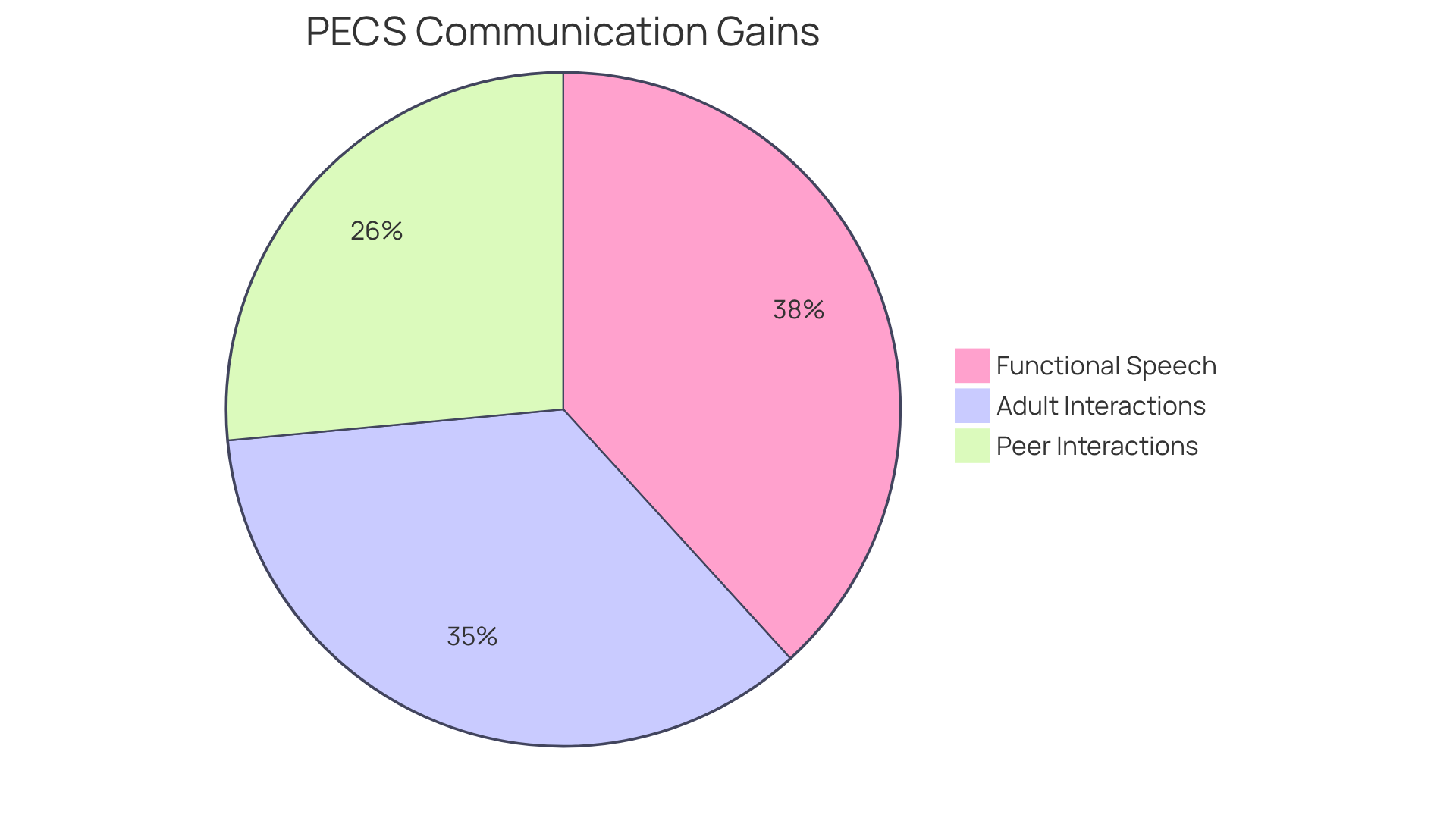
Functional Behavior Assessment (FBA) is a systematic method aimed at revealing the fundamental causes of difficult actions in youth. By systematically observing the child across different contexts and collecting data, practitioners can identify the antecedents—what happens before a behavior—and the consequences—what follows. This thorough examination is essential for creating that tackle the fundamental reasons for actions, rather than just managing symptoms with ABA interventions.
Recent research suggests that comprehending these triggers can significantly improve the efficacy of change strategies. Analysts of conduct stress that data-driven insights from FBAs are essential for developing effective ABA interventions (BIPs). As one specialist remarked, 'Recognizing these underlying reasons is essential for developing effective support plans.'
Furthermore, the aim of an FBA is to systematically identify the environmental factors that affect problem actions. Practical uses of FBAs showcase their efficacy; for instance, in situations where students display refusal actions, conducting an FBA can uncover specific triggers, enabling educators to implement ABA interventions that encourage compliance and involvement.
Significantly, the FA group has demonstrated a mean decrease of 99.6% in challenging conduct, compared to 98.7% in the non-FA group, highlighting the effectiveness of FBAs. By focusing on the nuances of behavior, FBAs not only facilitate immediate behavioral improvements but also foster long-term positive outcomes in educational settings.
Collaboration is crucial at every stage of the FBA process, ensuring that all stakeholders contribute to a thorough understanding of the individual's needs.
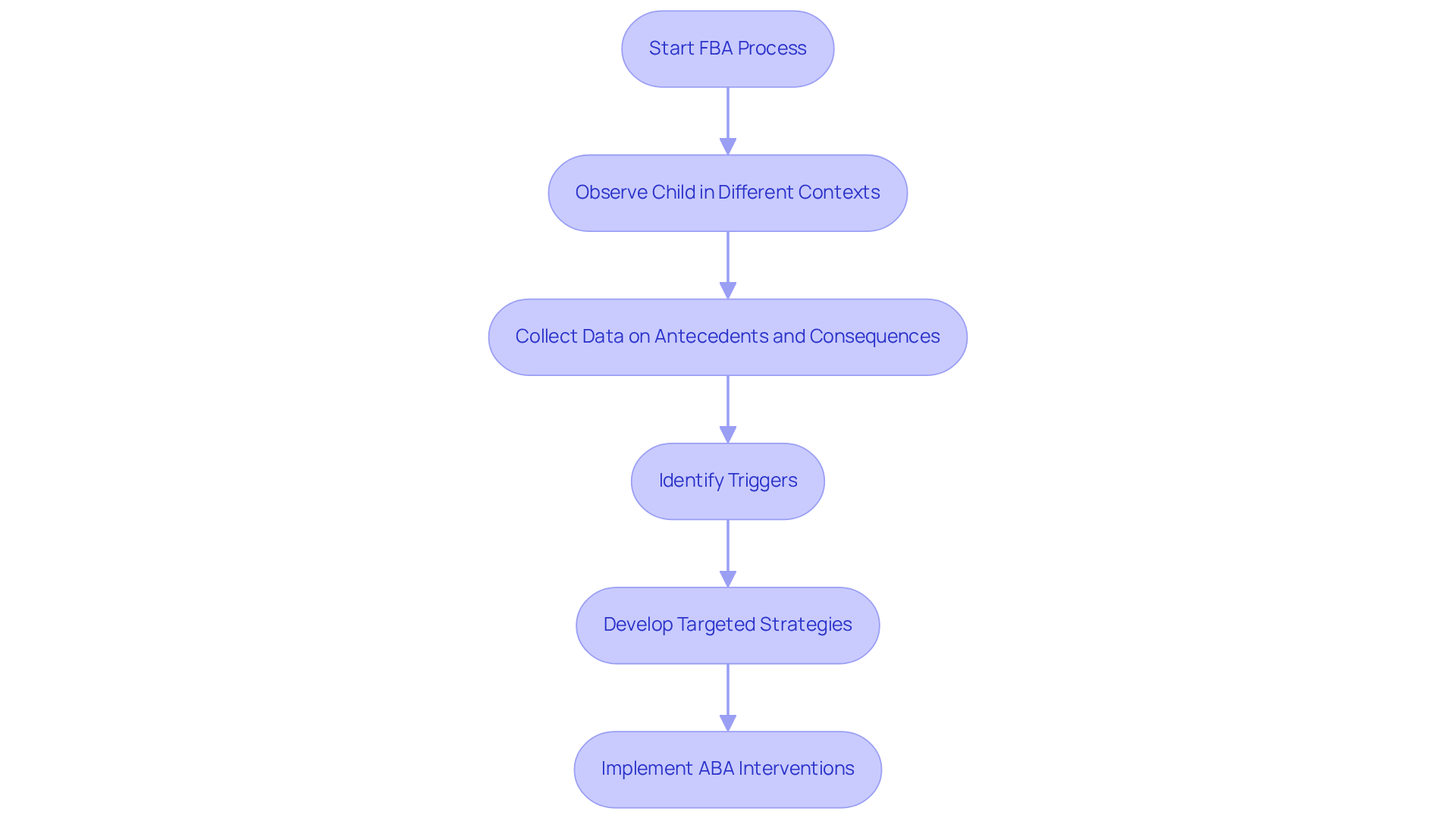
Natural Environment Teaching (NET) underscores the critical importance of learning through daily interactions, enabling youngsters to cultivate skills within their familiar surroundings. This approach not only facilitates the to real-life situations but also enhances the relevance and applicability of the learned material. By integrating learning opportunities into daily routines, therapists can craft meaningful experiences that resonate with young individuals, ultimately fostering improved social functioning and independence.
Recent studies indicate that structured opportunities for practice in naturalistic environments significantly bolster overall ability retention and application. As behavior analysts emphasize, the ability to apply acquired skills across diverse situations through ABA interventions is paramount for promoting independence and enhancing the quality of life for individuals with autism. Real-life applications of NET illustrate its efficacy; for instance, youngsters who practice taking turns during therapy often transfer this ability seamlessly to playtime with siblings, highlighting the power of learning in everyday contexts.
The benefits of this method extend beyond mere knowledge acquisition, as it cultivates a deeper understanding of social norms and expectations, empowering young individuals to thrive in their environments.
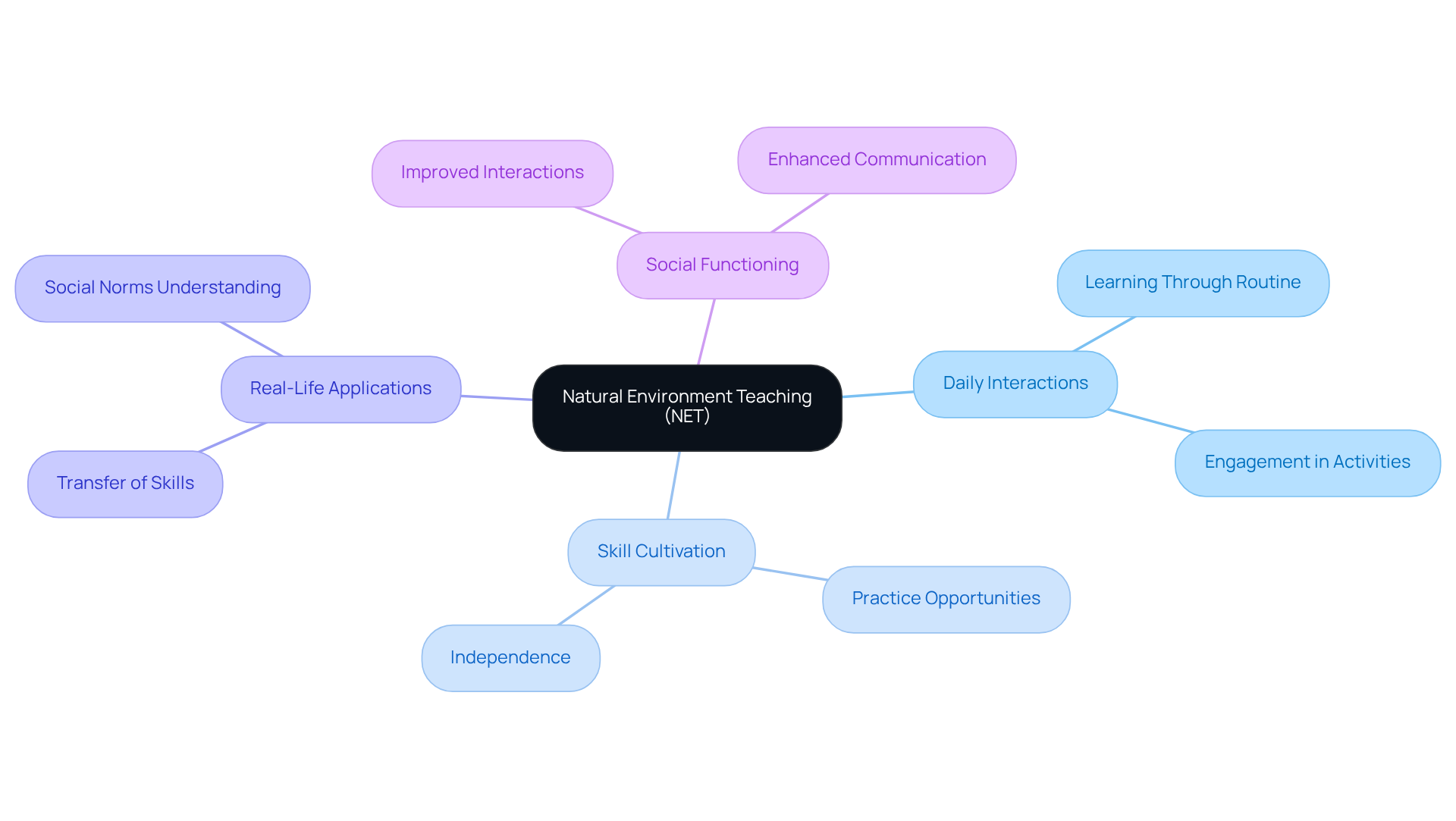
Parent training is a pivotal element of [ABA interventions](https://hireaba.today), equipping families with the essential skills and knowledge to effectively support their children's development. By equipping parents with training on proven strategies and techniques, therapists ensure that ABA interventions remain consistent across both home and therapy environments. This collaboration not only fosters a supportive atmosphere but also significantly enhances the young person's progress and overall well-being.
Research underscores that in ABA interventions yields superior outcomes for children, with studies revealing that those whose parents engage in training advance up to 47% faster than their peers receiving solely clinical intervention. Moreover, it is striking that 74% of autistic students graduate with a diploma, compared to 86% of their non-autistic counterparts, underscoring the critical role of early intervention.
Effective parent training techniques, such as ABA interventions, encompass:
Furthermore, integrating structured learning opportunities throughout daily routines—such as during mealtimes or bath time—allows parents to seamlessly incorporate ABA interventions into their everyday life. By blending these training techniques into common household activities, the learning experience is significantly enriched.
Current trends in parent training emphasize the necessity of personalized learning plans tailored to each family's unique needs. Programs frequently include:
These elements empower parents to refine their techniques and ensure consistent application of ABA interventions at home. Consistent communication between parents and therapists is vital for adapting to the individual's evolving requirements, particularly in relation to ABA interventions to ensure that strategies remain effective.
Quotes from behavior analysts illuminate the transformative potential of parent training:
These highlight the essential role families play in their children's development. By fostering a cooperative relationship between parents and therapists, the opportunity for beneficial transformation in young lives is greatly amplified.
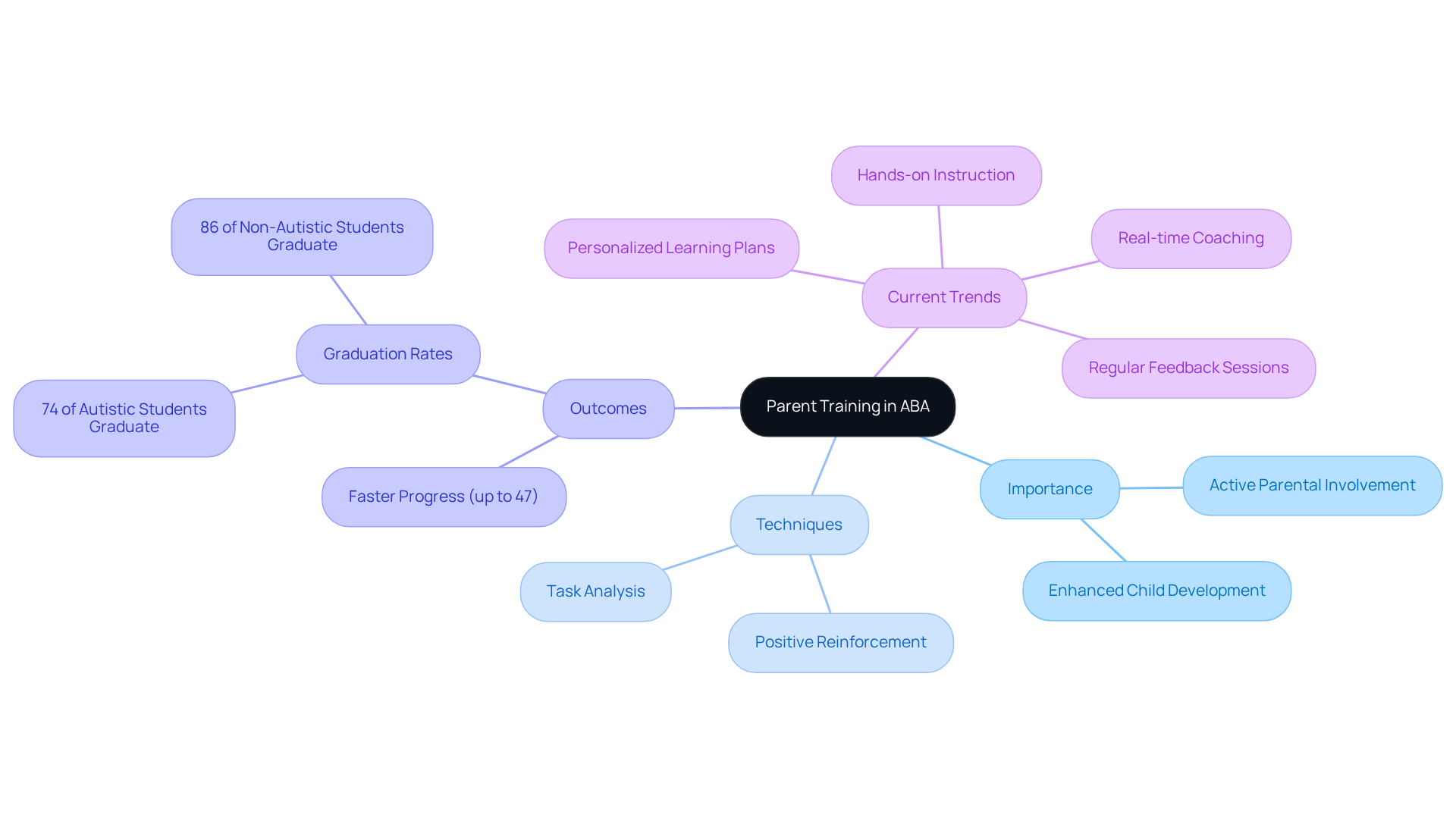
Social abilities training is essential for equipping youngsters with the tools needed to engage successfully with peers and adults. This training typically encompasses methods such as role-playing, modeling, and direct instruction on . By focusing on these skills, children enhance their ability to form meaningful relationships, participate in group activities, and navigate various social situations. This not only promotes better social integration but also significantly contributes to their overall development.
Analysts emphasize that strong interpersonal skills are crucial for success in both academic and social environments. Research indicates that students involved in social and emotional learning programs tend to score higher on standardized tests and are less likely to engage in high-risk behaviors that disrupt learning.
Practical applications of social abilities training, including structured peer interactions and community involvement, further solidify these competencies, enabling youngsters to practice and refine their skills in supportive settings. Role-playing, in particular, serves as a powerful tool in this process, allowing youngsters to simulate social scenarios and build confidence in their interactions.
Furthermore, participants in Individual Social Skills Training (ISST) programs generally receive an average of 8.59 hours of intervention, which has been shown to significantly enhance their social skills and overall development.
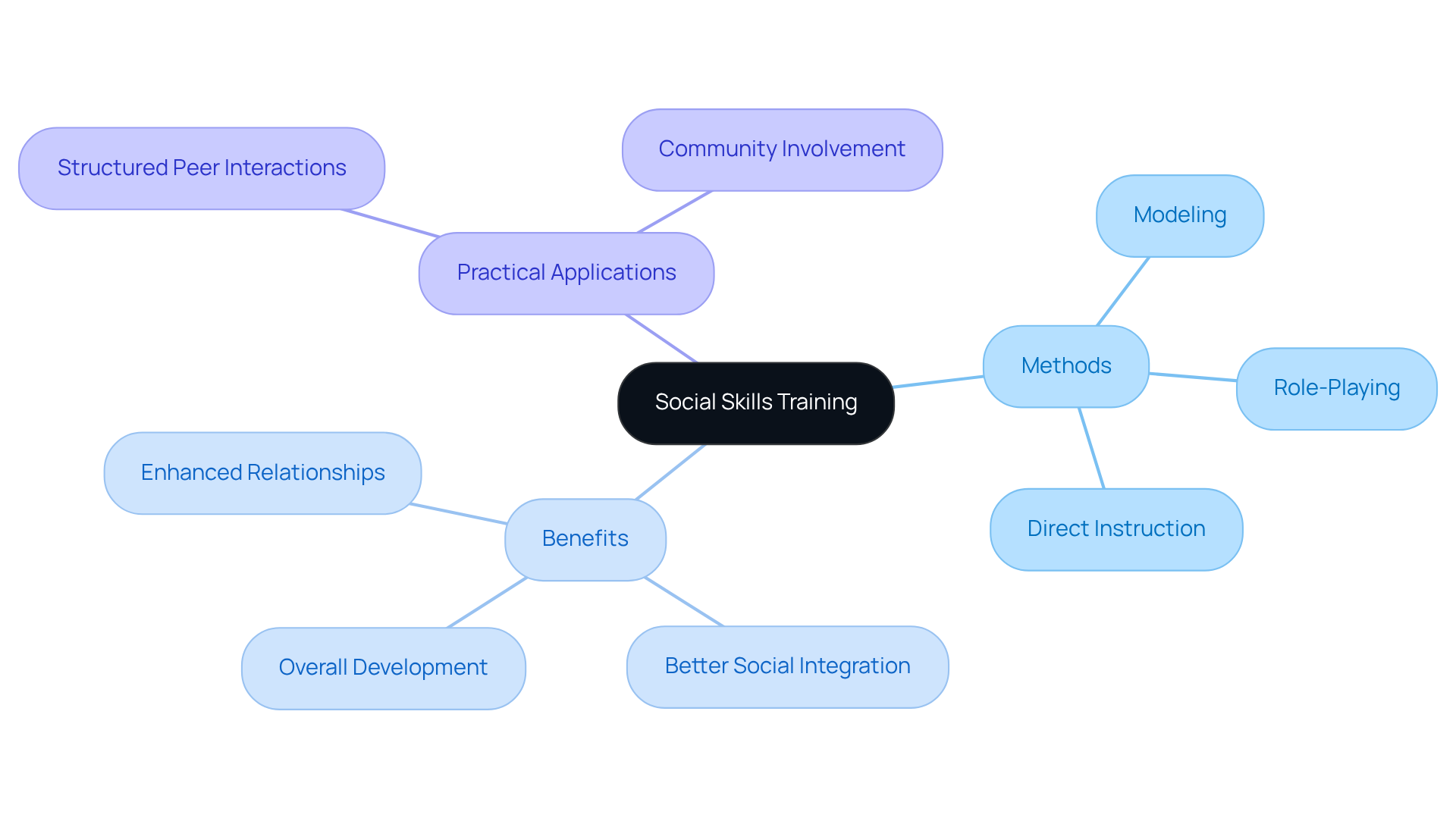
Token economy systems serve as powerful management tools that utilize tokens as reinforcement for positive behaviors. In practice, children earn tokens for exhibiting desired actions, which they can later exchange for various rewards. This structured methodology not only motivates children to engage in positive behaviors but also teaches the principles of delayed gratification and goal-setting.
For example, in educational environments, teachers have observed marked enhancements in student engagement and participation when implementing token economies, fostering a more constructive learning atmosphere. Research indicates that these systems effectively reduce disruptive behaviors and enhance overall classroom dynamics, particularly among students with special needs.
Behavior analysts emphasize that the immediate feedback provided by tokens boosts motivation and reinforces preferred actions, positioning token economies as a vital component of ABA interventions. By cultivating a sense of accomplishment and promoting consistent involvement, token economies not only alter behavior but also nurture essential life skills, ultimately contributing to the comprehensive development of children.
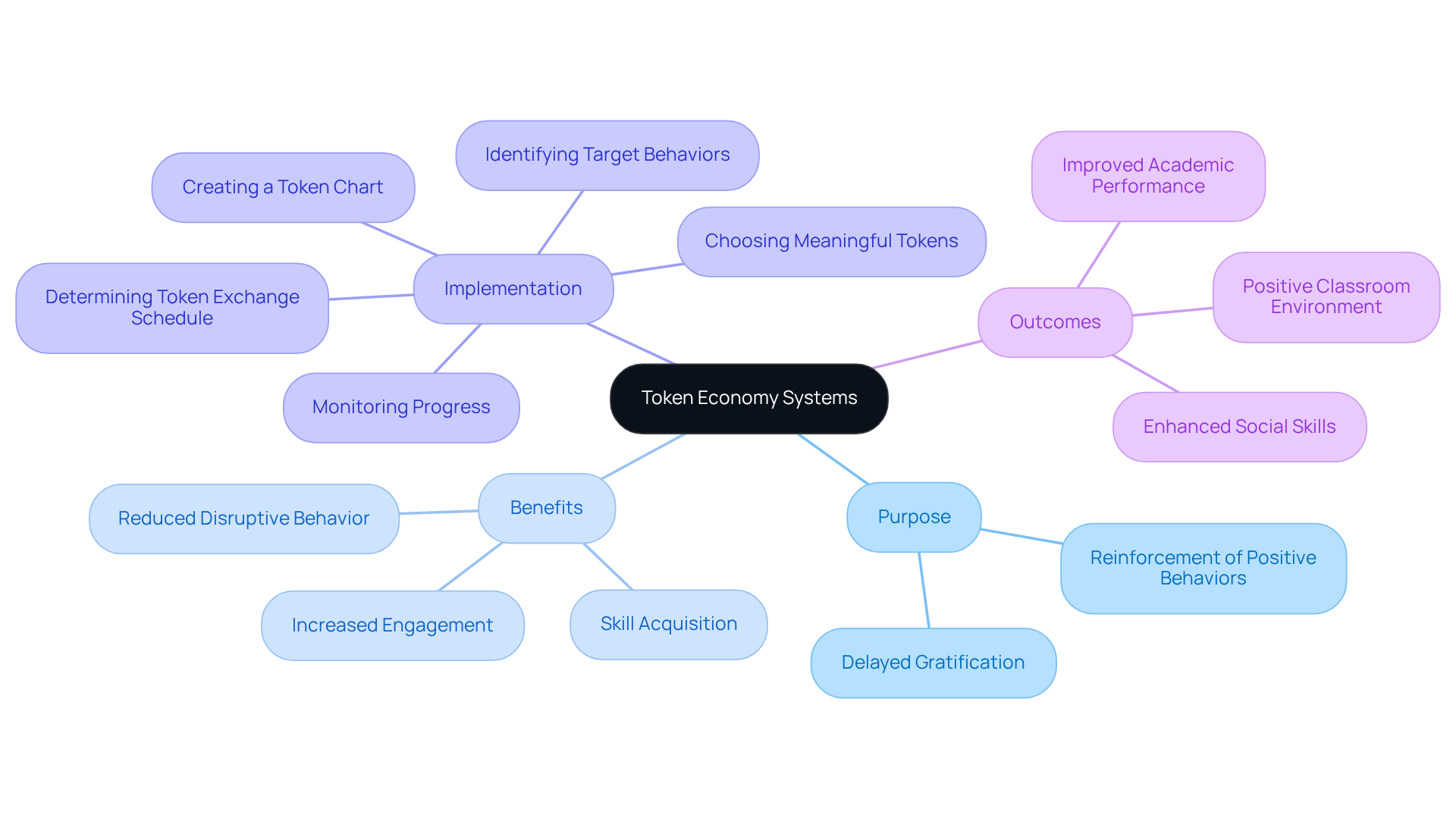
The landscape of Applied Behavior Analysis (ABA) interventions is undeniably vital, teeming with strategies crafted to drive effective behavior change in children. By employing techniques such as positive reinforcement, Discrete Trial Training, and Pivotal Response Training, practitioners are equipped to develop tailored approaches that align with the distinct needs of each child. These interventions not only facilitate the acquisition of essential skills but also bolster communication, social interactions, and overall developmental progress.
Key insights underscore the significance of structured methodologies like the Picture Exchange Communication System and Functional Behavior Assessment, which offer essential frameworks for comprehending and tackling behavioral challenges. Moreover, Natural Environment Teaching and Parent Training empower families and educators to reinforce learning within everyday contexts, ensuring that skills extend beyond the confines of therapy sessions. The integration of Token Economy Systems further illustrates how motivation can be effectively harnessed to promote positive behaviors.
Ultimately, the relevance of these ABA interventions transcends immediate behavioral adjustments; they lay the groundwork for long-term growth and independence in children. By embracing these evidence-based strategies, professionals and families can collaboratively cultivate supportive environments that nurture meaningful development. The call to action is unmistakable: leverage these indispensable ABA interventions to not only transform individual lives but also to contribute to a more inclusive and understanding society.
What is Hire ABA?
Hire ABA is a recruitment platform designed to connect qualified Board Certified Behavior Analysts (BCBAs) with job opportunities in the field of Applied Behavior Analysis (ABA) therapy.
Why is there a growing demand for BCBAs?
The demand for BCBAs is projected to increase by 25% by 2026, highlighting the need for professionals to find suitable job opportunities in this expanding field.
How does Hire ABA streamline the hiring process for BCBAs?
Hire ABA streamlines the hiring process by providing personalized resume assessments and utilizing advanced job fit scoring to match candidates with roles that align with their skills, preferences, and desired locations.
What evidence supports the effectiveness of Hire ABA?
The platform has successfully placed candidates in various roles, such as a Legal Director position filled within a month of engagement, demonstrating its ability to match talent with job opportunities swiftly.
What role does positive reinforcement play in ABA interventions?
Positive reinforcement involves providing immediate rewards following desired actions, which significantly increases the likelihood of those actions being repeated. It is a key component of ABA interventions that fosters preferred behaviors.
What forms of reinforcement are commonly used in ABA interventions?
Common forms of reinforcement include verbal praise, tokens, and tangible rewards, all tailored to the individual preferences of the student.
How does positive reinforcement benefit children in ABA therapy?
The regular application of positive reinforcement encourages constructive behaviors, enhances overall development, and improves social interactions and communication skills in children.
What is Discrete Trial Training (DTT)?
Discrete Trial Training (DTT) is a structured teaching approach that breaks down skills into small components, involving a clear instruction, a response from the learner, and a consequence, which can be reinforcement or correction.
Why is DTT effective for individuals with autism?
DTT is effective for individuals with autism as it establishes clear expectations and provides prompt feedback, facilitating skill acquisition in a controlled environment.
Our expert recruitment strategies and AI-driven sourcing ensure that you receive top-notch candidates quickly, without compromising on quality. Whether you’re looking for BCBAs, Clinical Directors, or RBTs, we’ve got you covered.